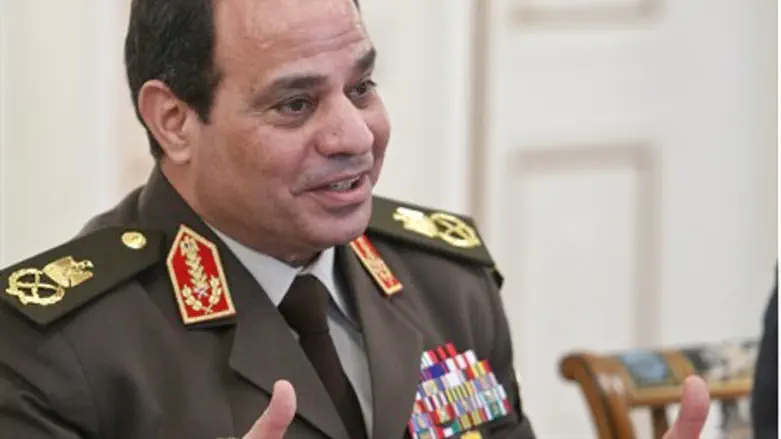
Egypt’s former army chief Abdel Fattah al-Sisi may have won the presidential elections, but former Israeli Ambassador to Egypt Tzvi Mazel told Arutz Sheva that Sisi will have a hard time putting the country in order.
"Egypt is a poor country, with 85 million residents. Every half year another half a million babies are born there, and every year 800,000 residents join the mass of job seekers; the financial situation is very difficult," reported Mazel.
Without support from the West, Mazel says Sisi will have a rough time rehabilitating the Nile state which was rocked by the 2011 "Arab Spring," and recently by clashes between the military and the Muslim Brotherhood. Former President Mohammed Morsi of the Muslim Brotherhood was ousted last July.
"At this stage, Europe and also (US President Barack) Obama have turned a cold shoulder on Sisi, claiming that he held a military coup and suspended the elected president; that's a serious problem," remarked Mazel.
The Egyptian public is liable to start a new revolution at any time if the situation remains unstable, according to Mazel.
"Egypt has a security problem with the Muslim Brotherhood, Sisi established an elite counter-terror unit. Now he's the new hope and the people will let him work, but you need to remember that the people lost its fear of the regime, and if Sisi will act like a dictator, they may take the streets again," said Mazel.
Indeed the Muslim Brotherhood called for demonstrations in the streets on Friday following the election. As far as acting like a dictator, Sisi has already warned that he will not give journalistic freedom. Former Egyptian Prime Minister Ahmed Shafik in March said that the elections will be rigged for Sisi, adding he had decided to take himself out of the running.
Regarding the peace treaty with Israel, Mazel opined that Sisi would preserve the status quo.
"In a series of interviews before the elections he said that the peace with Israel is stable, and that despite all the challenges, the peace is accepted by the Egyptian people and that it's important for us to work together for the prosperity of Egypt," the former ambassador noted.
Sisi in those interviews stated that there was a chance for "true peace" if Israel adopts the 2002 Arab Peace Initiative, which demanded Israel withdraw from Judea and Samaria at which point the Arab states would supposedly recognize it.
In the same interview Sisi said he would be willing to change the peace agreement with Israel.